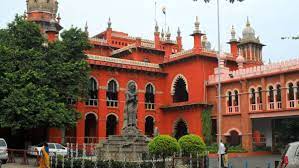Homemaker wives are entitled to an equal share in their husband’s property: Madras High Court
By Lokmat English Desk | Published: June 26, 2023 04:18 PM2023-06-26T16:18:02+5:302023-06-26T16:18:17+5:30
The Madras high court held that women home makers are entitled to equal share of property purchased from their ...

Homemaker wives are entitled to an equal share in their husband’s property: Madras High Court
The Madras high court held that women home makers are entitled to equal share of property purchased from their husband’s income, and said that a wife being a homemaker is a job of 24 hours without holidays, which cannot be less equated with that of an earning husband who works only for 8 hours.Justice Krishnan Ramasamy observed that the wife contributes to the family by taking care of the household and the children.“In generality of marriages, the wife bears and rears children and minds the home. She thereby frees her husband for his economic activities,” justice Krishnan Ramasamy said. “Since it is her performance of her function which enables the husband to perform his, she is in justice, entitled to share in its fruits.”
Recognising that there is no legislation enacted to acknowledge the domestic contributions done by a wife who works as a homemaker, the judge said that he is of the view that if the acquisition of assets is made by joint contribution of both the spouses–one by employment, the other by caring for the family, certainly, both are entitled to equal share. The court observed that a wife being a homemaker multitasks with skills of a manager, a chef, a home doctor, a home economist. While announcing its decision on the share in properties, the court factored in the contribution which wives make towards the acquisition of the family assets by performing these domestic chores so the husbands are responsible for gainful employment, saying that the spouse who looks after the home and cares for family for decades is entitled to a share in the property.“If, on marriage, she gives up her paid work in order to devote herself to caring for her husband and children, it is an unwarrantable hardship when in consequence she finds herself in the end with nothing she can call her own,” the court said. “The property may be purchased either in the name of husband or wife alone, but nevertheless, it is purchased with the monies saved by their joint efforts.” The verdict was passed when the court disposed off a 2016 case where the plaintiff, late Kannaian Naidu had accused his estranged wife and the first defendant, Kamsala alias Banumathi, of purchasing properties with his earnings, usurping them and having an extra marital affair. After his death in 2016, their three children continued the plaintiff’s case against their widowed mother.The defendant’s counsel V Anusha, denied the affair and submitted that the couple, who got married in 1965, had a mutual understanding that she would stay at home and take care of their children (two sons and a daughter) while the husband could work abroad. Otherwise, the defendant would have joined work as a teacher and could earn equally. The couple used to live in Tamil Nadu’s Neyveli. When their children were minor, the late plaintiff shifted to Saudi Arabia to work at a steel company from 1983 till December 1994, before he returned. The court said, in this case, if the wife wouldn’t have agreed, the husband could not have gone abroad and earned “all the money”. The wife rendered her continuous services for 24 hours by cooking meals, taking care of the children, sending them to school and doing the household chores, the court said, adding that had the husband engaged maids for three shifts at 8 hours each daily, he might have spent huge money, which would not have been sufficient to purchase properties or save anything.
Open in app